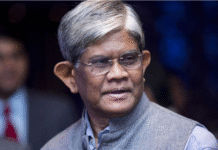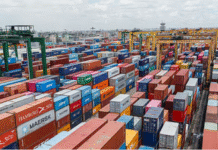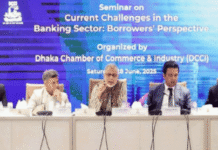
In its election manifesto, the ruling Awami League had attached high priority to upgrading the Dhaka-Chittagong highway into four lanes. Four and a half years down the line, the party has claimed the project to be “successful” on the city billboards grabbed overnight.
But in reality, the project has fallen flat on its face, with only 30 percent work done in the last seven years. It is now anybody’s guess as to when the project will be finished.
A study by the Implementation Monitoring and Evaluation Division (IMED) of the planning ministry in June this year found that an unprecedented delay of four years just to appoint a contractor is mainly responsible for the slow progress.
But there are many other reasons that have led to the present state of the project, considered to be vital in improving road links between the capital and the port city.
If the government wants to complete upgrading the highway in line with the second revised schedule, the 70 percent work left to be done has to be finished within one and a half years.
Communications Minister Obaidul Quader said the major challenge for the project had been acquiring land for widening the highway. Now that the problem is no more there, he believes the work will now progress swiftly.
He also held out the assurance that there was no problem with funds.
Communications Secretary MAN Siddique yesterday told The Daily Star that the authorities hoped the work could be completed within the stipulated time.
He said three out of four layers of the main road had been completed and the carpeting would start after the monsoon.
But a visit to the spot revealed that sand and earth had been dumped on both sides of the highway earmarking only the alignment.
Zaid Bakht, research director of Bangladesh Institute of Development Studies (BIDS), has his doubts that the remaining work could be covered in just one and a half years.
In the coming days political unrest, including probable hartals, might slow down the work pace, he said, adding that the contractors, who got the job by bidding lower than the estimated cost, might deliberately delay the work to obtain more money by using political influence.
The IMED study pointed out that frequent changes of the project director and awarding of a large chunk of work to a single company also delayed the project.
This not only cost time but also increased the project cost by 47 percent. According to the IMED study, the estimated project cost now stands at Tk 3,190 crore which was originally Tk 2,168 crore.
As a priority project, the last BNP-led government had floated a tender for the project to pre-qualifying bidders in October 2005, before it was approved in January 2006. The construction work was then split into 10 packages.
But the then government suddenly hurried the tender preparation and asked officials to fix designs, work schedule and work costs within seven days. This resulted in inconsistencies in the work costs.
When the BNP-led government’s tenure ended and a military-backed caretaker government took over in January, 2007, the latter cancelled the tender over corruption allegations. Inconsistency in work costs was also one of the reasons for the cancellation.
Since then the project has remained jinxed.
In March, 2008, a second tender was floated which got stuck in court when some firms filed writs.
By the time the writs were settled, the AL-led government assumed office. In April, 2009, it floated the tender for the third time and finalised it in October that year.
Similarly, four years were wasted in appointing the design and supervision consultant as the first contractor appointed in 2006 had failed to fulfil some contractual obligations. Another contractor was appointed in 2010.
Finally, the road work began in January, 2010, and the bridge work in February, 2012. By this time, six years had elapsed.
LOW PRICE
The IMED study also found that every contractor had quoted 14.47 percent lower price than that of the government estimated rates for constructing the road.
The report said each of the contractors was working at a very slow pace but did not mention any reason for it.
Meanwhile of the 10 packages of the project, seven were awarded to the Chinese company Sinohydro Corporation Ltd. The study said the company failed to mobilise manpower, equipment and construction materials on schedule.
The contractors who bagged work for building bridges and flyovers also lacked the same factors resulting in slow progress of the works, achieving 17 percent of the target.
The report recommended that the authorities monitor the progress closely so that the work could be finished on time.
CHANGES OF PD
The study said the project director in the venture had been changed 11 times in the last seven years.
Five of them, including the incumbent one, were employed on a part-time basis although such massive work requires full-time supervision.
The government policy was not followed while changing the project directors. Such changes require recommendations from a high-level committee led by the prime minister.
LAND BLOCK
Communications Minister Obaidul Quader identified land acquisition as one of the major challenges that delayed the work progress.
He said legal complexities and social barriers in relocating graveyards, mosques, temples and educational institutions had eaten up most of the time so far.
Besides, earth to fill the low lands and lack of bitumen were also identified as obstacles to progress. So far 11 hills have been cut to collect the earth for filling, the study pointed out.
Source: The Daily Star










Most sadly, our leaders in both position and opposition hardly know on what the real development of a country mainly depends. Neither during the over-10-year of BNP nor the same of the AL, the govt was able to realize the urgency of improving the transport and communication network of the country. They failed to realize this sector is as important as the circulatory system of human body. But look, during these long 43 years, the rail line between Dhaka – Chittagong – which our top govt bosses declared ‘economic capital’ of the country (maybe only to swindle people) – remained mostly single track. The Dhaka-Chittagong highway 4-lane project is yet to be completed, the railway service has been neglected so long etc etc. Notwithstanding these facts, billions of money has been spent and the vested quarters have reaped the fruit of the blood and sweat of our common people. This time too, the priorities of the present govt shifted and shuffled not to the benefit of the common people on whose vote they came to power but they have right from the beginning, set to implement their agenda they kept secret until recently. We common people are really unfortunate!